Description: War Thunder is a next generation military MMO game dedicated to...

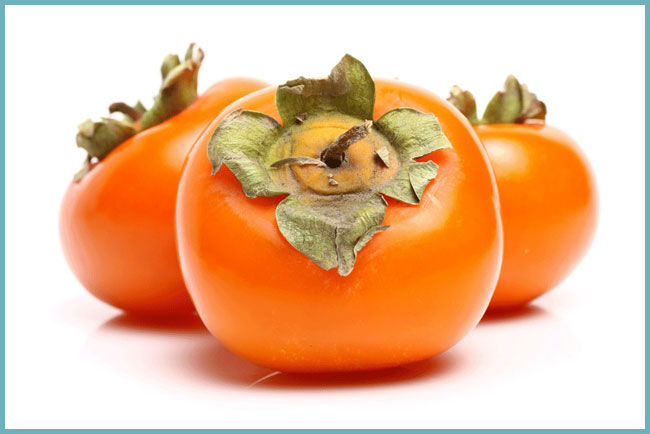
native of East Asia- persimmon - fell in love with the inhabitants of other parts of the world because of its unusual, unique taste. In addition, for both women and men, the berry can become an assistant in the treatment or prevention of diseases. True, there are some contraindications. The article will talk about the beneficial and harmful properties of orange sweets.
Today, it is quite easy to find persimmons in the market or in a greengrocer's shop. There are several varieties of it, as well as ways of ripening. Softer, harder, sweeter, with a bright or slightly astringent taste - different fruits also differ in chemical composition. But in one they are similar: they are a storehouse of vitamins and trace elements. The benefits of persimmon are concentrated not only in the pulp, but also in the peel. The main element that determines the degree of viscosity is tannin, which belongs to tannins. The more astringent the taste of the berry, the more tannin it contains. The riper the fruit, the less this substance in it.
Advice. Tannin breaks down at low temperatures, so persimmons are not recommended to be frozen or even simply put in the refrigerator. If the berry you bought is unripe, it is better to let it ripen to an edible state in the heat.
Also in the persimmon are:

Persimmon contains many useful substances
There is a lot of sucrose in persimmon, but the berry is considered low in calories. It usually contains 50-70 kcal per 100 g. Of course, consumption is appropriate in moderation due to some properties of the berry. For example, it increases the feeling of hunger.
Persimmon has several qualities that are useful for people with kidney disease:
Tannin provides antibacterial qualities. It is effective against Staphylococcus aureus, several types of Escherichia coli. Diuretics help to remove salts from the body. Magnesium prevents the development of kidney disease. A low content of citric and malic acids normalize the functioning of the kidneys, liver and excretory tract in general.
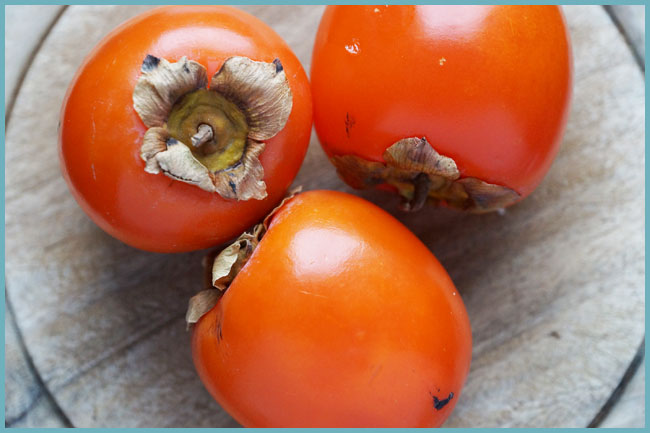
Don't Eat Too Many Persimmons a Day
The main contraindication for pregnant women is intestinal obstruction due to an excess of persimmon in the diet. At the beginning of the term, you should not eat more than half of the fetus once a day. For young mothers who are breastfeeding, doctors do not recommend eating persimmon before the baby is 4 months old. Children cannot eat orange berries on their own until the age of 3, because their digestive system is not yet fully formed.
With a stomach ulcer, it is important to control the acidity of the foods eaten. Persimmon in this regard is a convenient berry, because it contains only 0.2% of the total mass of acids. But another property makes the fruits undesirable for sick "ulcers". Hard peel, fibers in the pulp mechanically irritate the diseased mucous membrane of the internal organ, which will adversely affect recovery. When the disease has receded or the process of amendment has reached the finish line, it is allowed to eat only ripe and not tart persimmons.
25% sucrose makes the berry undesirable for people with diabetes to eat. As in the case of a banana or grapes, persimmon contributes to a sharp increase in blood glucose. With different degrees of the disease, doctors may allow you to eat no more than half a berry a day, with a general strengthening purpose. Also, persimmon (vitamins C and P) strengthens the walls of blood vessels, which has a positive effect on angiopathy, a frequent companion of diabetes.
Today, when the methods of transporting tropical fruits have become more perfect, persimmons can be found even in the most remote northern regions. This amazing fruit with fragrant and sweet pulp has been known for a long time, but only residents had the opportunity to taste it in its ripe form. southern regions. But the degree of maturity of the persimmon is very important, because only then it does not have a tart taste and mouth-astringent properties.
This crop grows only in warm climates, however, due to the large number of useful components of the chemical composition of fruits, its popularity has gone far beyond the subtropics. At the same time, not only persimmon berries are valuable, but also wood, which is used to make musical instruments.
The taste of persimmon fruits is very sweet, but despite this, its energy value is on average only sixty calories per hundred grams of pure product. However, if we talk about dried fruits prepared from these fruits, then the calorie content increases four times. This explains the difference in that fresh fruits can be consumed when losing weight, while dried ones cannot.
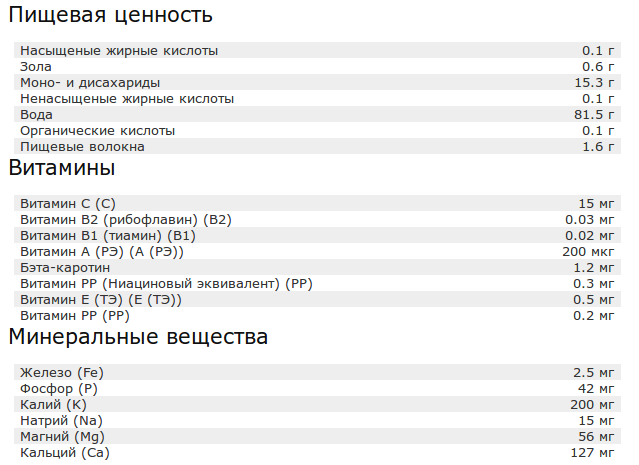
Depending on the specific variety of persimmon, and there are several hundred of them, the calorie content of the fruit does not change much. So, for example, the persimmon king has a minimum energy value, which has only fifty-two calories per hundred grams of product.
Due to the high content of glucose, it is strictly forbidden to eat persimmons for people with diabetes, as well as obesity.
AT chemical composition This fruit also includes beta-carotene, which gives it an appetizing orange color. It also contains protein, vegetable fats and glucose, which make persimmons so nutritious that a couple of ripe fruits are enough to fill you up for a long time.
Like most plants, it also contains ascorbic acid, which makes up 55% of the main composition. In terms of useful properties, this puts persimmon on a par with apples and oranges. Thanks to this, it shows excellent results in the treatment of bronchitis and colds. To do this, you can simply eat the fruits or brew the pulp with boiling water, and after cooling, gargle the sore throat.
In its turn astringent properties due to the presence of a large amount of tannins, namely tannin, which acts on the mucous membrane, leading to numbness. At the same time, the impact of this component is reflected not only on the oral cavity, but also on the walls. digestive system. Thus, unripe persimmons can provoke indigestion and even cause the formation of stones in the intestines. Therefore, it is important to pay attention to the ripeness of the fruit. However, if it so happened that you came across a tart persimmon, you can get rid of the astringent effect in various ways.
According to scientists, the benefits of persimmon for the body are really very high. It is especially recommended for people with diseases of the heart and blood vessels, as it strengthens the muscles of the heart, increases the level of hemoglobin in the blood, and also stabilizes blood pressure in hypertension.
Video. Useful and harmful properties persimmons
Another useful quality of persimmon is its diuretic properties, which makes it a good prophylactic against diseases of the kidneys and urinary system. But a decoction of ponytails is an effective remedy for enuresis.
In addition to the fruits themselves, traditional medicine also drew attention to the leaves of this tree, which, when dry, are a good biologically active remedy. Tea from persimmon leaves is very useful for older people who have varicose veins and a lack of iron in the blood.
The fruits of this plant are used not only as an internal, but also as an external medical remedy. Due to the bactericidal properties, the fruit pulp can disinfect wounds, heal burns, as well as infected cuts and bruises.
Helps persimmon pulp and acne. To prepare such a natural and healthy cosmetic mask, you need to mix protein from chicken egg and persimmon fruit in a blender, and then apply the resulting product on the face for twenty minutes.
Persimmon allows you to restore strength after operations, except when the latter was performed on the organs abdominal cavity. Due to the presence of calcium in it, it is useful to eat it for fractures, for the prevention of caries and during pregnancy. A positive effect on the liver and biliary tract has been established.
Persimmon is an orange fruit with fleshy pulp from trees of the Ebony family. This fruit appears on our table with the onset of cold weather. Persimmon intended for human consumption is cultivated in many countries: Spain, Italy, Bulgaria, Armenia, Georgia, China, and of course Russia. The sweet astringent taste of persimmon can leave few people indifferent. Meanwhile, there are several types of persimmon fruits, and the taste between them is not similar to each other. Persimmon is a fruit with a rich composition and many useful properties. What are the advantages of persimmon, the benefits and harms of this fruit, how to properly eat persimmons, whether persimmons have benefits and harms, and the no less tasty Sharon persimmon, we will consider in this article.
1. Orange fruits contain a large amount of beta-carotene, which is a natural antioxidant, prevents the aging of skin cells, the formation of wrinkles, protects the skin from free radicals and harmful factors environment. Beta-carotene is necessary for the normal functioning of the body's visual function, strengthens the eye muscle. Sharon persimmon is especially rich in beta-carotene, the benefits and harms of which are incommensurable, since Sharon contains more beta-carotene than champion products sweet peppers and tomatoes.
2. Monosaccharides present in persimmon have a positive effect on the work of the heart muscle, actively nourish it. Therefore, persimmon is indicated for use by patients with problems in the area of cardio-vascular system. Hypertensive patients, people suffering from anemia should also include persimmons in their diet.
3. Ripe persimmon contains a high content of vitamin C (up to 55%), which makes it a real prophylactic during colds and SARS. Vitamin C helps the immune system fight viruses, protecting cells from the penetration of a harmful infection.
4. The benefits and environments of persimmon are also determined by the impressive amount of trace elements necessary for humans:
5. Persimmon fruits have a diuretic effect. To remove accumulated sodium salts from the body, it is necessary to eat 2-3 ripe persimmons per day, supplementing with abundant hot drinks: milk, tea (for example, ginger tea is very useful).
6. Persimmon contains natural antidepressants: fructose and glucose. Therefore, if you are overcome by melancholy and depression, be sure to include in your daily nutrition several fruits of juicy persimmon.
7. Despite the considerable sugar content in persimmon fruits, they do not increase the blood glycemic index at all. This means that people with diabetes can safely enjoy persimmons. And a very small calorie content of the fetus - about 60 kcal - will please people who are obese and who want to lose weight. Persimmon will not let you get better, so you can eat it without fear. But, of course, within reason.
The benefits and harms of persimmons depend on correct use it in food, in an amount not exceeding the permissible norms. Do not eat more than four fruits of fresh persimmon per day. If you enjoy dried persimmons, then the limit is 20 pieces (dried persimmons are very small). Instead of sweets, it will be very useful for children to try dried persimmon - it tastes like dates familiar to everyone, and does not lose all its useful properties. On the contrary, it has a milder effect on the digestive system.
To get rid of the astringent taste of persimmons, it is enough to put the fruits in the freezer for half an hour. The taste may also disappear with the opposite storage, in heat, but this will take several days.
There are more than 740 types of persimmon today. Agree, quite an impressive figure. But our Russian market gets persimmons mainly of the two most delicious popular varieties. This persimmon "Korolek" and "Sharon".
Persimmon "Korolek" is used in an unripe form. It has two more names - "chocolate pudding", and no less original "black apple". When ripe, the persimmon reaches the size of a large green apple and can weigh up to a kilogram, and then its flesh acquires the taste and even the similar color of dark chocolate. You should not even think about it, the benefits and harms of the persimmon are the same as any other kind of persimmon. Not inferior in terms of the number of useful properties. In addition to the fact that this kind of persimmon is incomparable fresh, jam is made from persimmon "Korolek", various desserts are made, and baked. Drinks such as wine, beer are also made from this fruit.
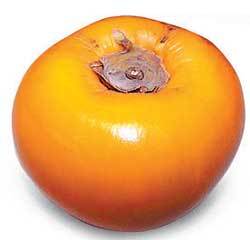 Persimmon "Sharon" has a more exotic taste - you can taste notes of quince, ripe apple and even apricot in it. This persimmon is a hybrid of an apple and a persimmon grown in Japan. You will be surprised, but "Sharon" does not contain seeds at all. This kind of persimmon has practically no viscosity due to the low content of tannin in the composition. Speaking of a fruit like persimmon, the benefits and harms of sharon are simply obvious - excellent taste, elastic pulp, high content of dietary fiber. Dietary fiber perfectly cleanses the intestines from toxins and toxins, normalizes work gastrointestinal tract. In terms of beta-carotene content, sharon surpasses even pumpkin.
Persimmon "Sharon" has a more exotic taste - you can taste notes of quince, ripe apple and even apricot in it. This persimmon is a hybrid of an apple and a persimmon grown in Japan. You will be surprised, but "Sharon" does not contain seeds at all. This kind of persimmon has practically no viscosity due to the low content of tannin in the composition. Speaking of a fruit like persimmon, the benefits and harms of sharon are simply obvious - excellent taste, elastic pulp, high content of dietary fiber. Dietary fiber perfectly cleanses the intestines from toxins and toxins, normalizes work gastrointestinal tract. In terms of beta-carotene content, sharon surpasses even pumpkin.
There are no special contraindications to the use of persimmon. But I would like to say about the possible consequences that may arise when overeating persimmon fruits.
— Astringent persimmon, mostly unripe fruits, are very poorly digested by the body. Indigestion may occur.
- Persimmon is undesirable to use after operations performed in the abdominal cavity. The point is again in tannin, which gives the fruit viscosity. The high content of tannin can cause constipation, acute intestinal obstruction, and even the need for urgent surgery.
- In adhesive diseases of the intestine, the use of persimmon is contraindicated.
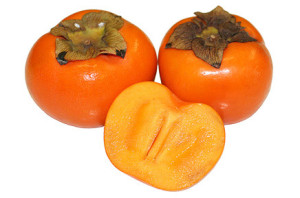
Do not buy spoiled, crushed persimmons, as well as fruits with dark spots, cracks. It is best to choose soft, but not lost elasticity fruits. If the fruit is a little "wrinkled", this only indicates that it is very sweet in taste. The smell of persimmon should be pleasant and fresh - spoiled fruits give themselves out precisely by a slightly “sour” smell. Always rinse persimmons with warm water before use.
Delicious and ripe persimmons to you, bon appetit!
AT autumn period it is important for the human body to stock up on useful vitamins and microelements, as well as strengthen the immune system, so in this article we will consider one of the favorite assistants in this business - persimmon (kinglet), we will consider in detail beneficial features and contraindications of persimmon for the human body, its composition and calorie content, as well as the health benefits of women, children and men.
The fruits of persimmon and beetle are rich in content beneficial vitamins, trace elements, sucrose and glucose, which have a beneficial effect on the human body, help strengthen the immune system. That is why persimmon is so useful and recommended for use in the season of its ripening.
The calorie content of persimmon is about 60 kcal, while it mainly contains carbohydrates (about 17 grams per 100 grams of fruit).
Let us consider in more detail what are the benefits of persimmon for human health.
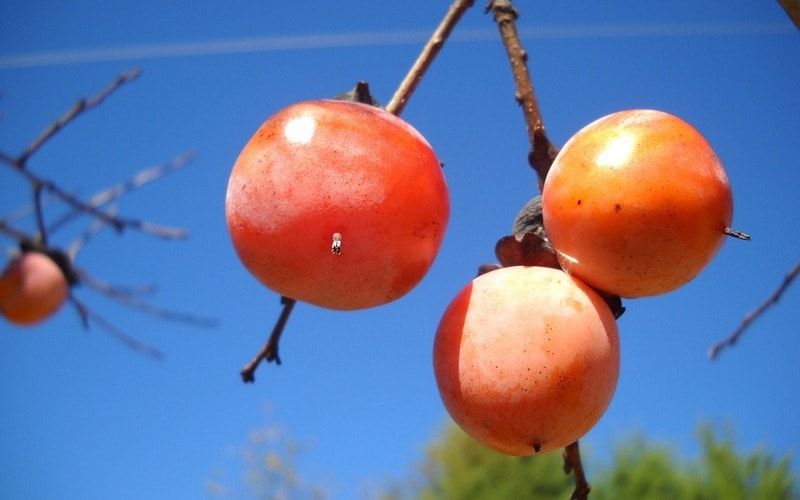
Ripe persimmon has many useful and healing properties, helps fight various diseases, and also helps prevent some of them (good preventive properties):

Among the main beneficial properties for the human body, for men, one can distinguish an increase in efficiency, strengthening the nervous system (useful in dealing with stress), and most importantly, persimmon is useful for men as a prophylactic against prostatitis.
When asked if children can have persimmons, you can answer yes, but only from the age of three and in small doses.
Many useful properties of persimmon will favorably affect the child's body, help strengthen his immunity before winter, and the children's body will replenish the reserves of useful vitamins and minerals.
Important: it is better for children to eat persimmons of the kinglet variety, in which there is a small content of the astringent substance tamine.
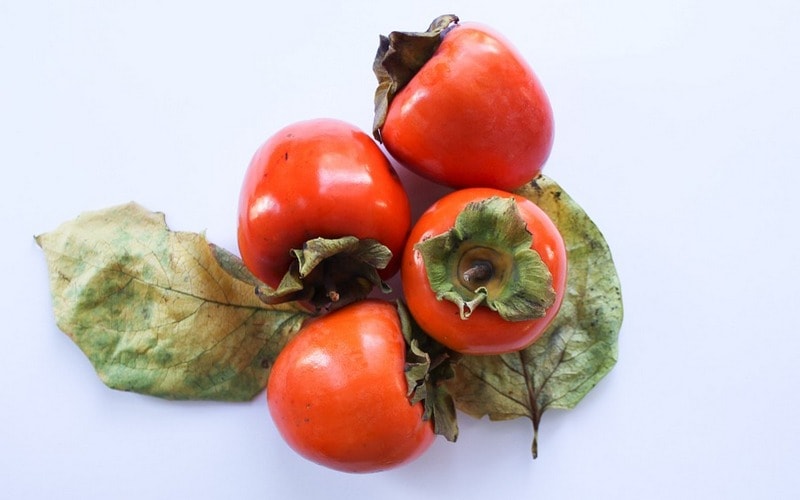
Persimmon is very useful for a person, but nevertheless it has its own contraindications, so let's consider how persimmon is harmful:

In most cases, persimmons and kinglets are eaten without cooking, as they are so tasty and original in taste.
Persimmon is used to prepare various drinks (fresh juices, wines and even beer), salads, meat dishes (from poultry) and of course desserts (jelly, puddings, jams, in pies and just with ice cream or yogurt). No less popular is dried persimmon, which is also very tasty and healthy.
In conclusion to the article, it can be noted that the beneficial properties of persimmon have been known to people for far from the first year, it is widely used for prevention. various diseases and simply useful for the human body (both adults and children). We hope that knowledge of the health benefits and harms of persimmons will help you better understand food and choose only healthy food for yourself. We leave our reviews about the beneficial and healing properties of persimmon for the body of adults and children in the comments to the article and share it in in social networks if it was helpful to you.
Persimmon is the fruit of a tree of the same name, in some cases a shrub belonging to the ebony family. This berry is large in size, has a sweet taste, it is juicy, its skin is usually orange, yellow or red. The mass of the fetus is on average 100-500 grams. Persimmon belongs to heat-loving plants; it grows in the countries of America, Eurasia, in Australia and even in southern Ukraine. There are close to five hundred varieties of persimmon.
To prevent the development of diseases of the cardiovascular system, you need to regularly consume persimmons. In this case, it provides the human body with much more benefits than apples. This property of persimmon has been proven by scientists.
Persimmon contains in its composition a large amount of dietary fiber, polyphenols and minerals, especially tannins, and they are known to be the strongest antioxidants. The main cause of diseases of the cardiovascular system, strokes and heart attacks is atherosclerosis. The above substances take an active part in the fight against this phenomenon.
Persimmon contains twice as much dietary fiber as apples. Also, persimmon contains more potassium, manganese, iron, calcium, antioxidants of phenolic origin. Apples have more zinc and copper. To prevent atherosclerosis, it is recommended to eat one persimmon per day.
There are approximately 125 calories in a persimmon fruit, of which 10 calories are from fat (data are based on one average fruit weighing 170 grams).
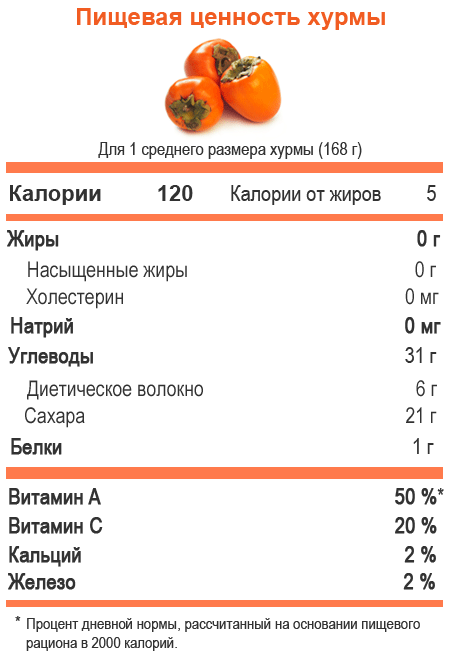
Persimmons are free of cholesterol, saturated fats and regular fats. It contains many useful vitamins and minerals, for example, 100 grams of the fruit contains approximately 15 mg of sodium, 200 mg of potassium, 60 mg of magnesium, 3 mg of iron, 40 mg of phosphorus, 130 mg of calcium, a lot of nickel, manganese, iodine, citric acid, malic acid, vitamin B1, B2, vitamin C, vitamin B3. Approximately 35% of the easily digestible carbohydrates in persimmons are glucose and 50% are fructose.
Persimmon has long been famous for its laxative, diuretic, immunomodulatory properties. She is natural remedy which protects the liver. In addition, persimmon helps to cope with various diseases.
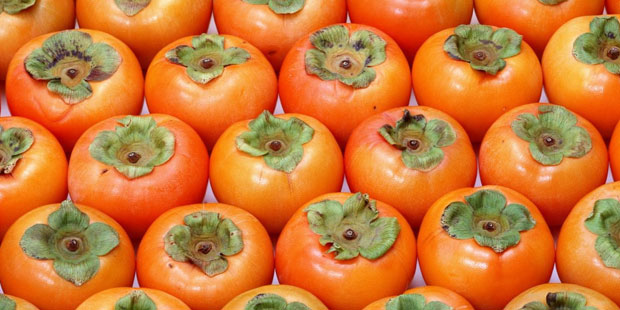
Persimmon contains the substance catechin, which has strong antihemorrhagic, anti-inflammatory and antibacterial properties. And, of course, persimmon has a large amount of useful minerals and vitamins.
Persimmon fruit contains a large amount of antioxidants, such as ascorbic acid, betulinic acid, sibatol, beta-carotene. All these substances prevent premature aging, they are a good prevention of cancer,.
For constipation
The product has a mild laxative effect on the body due to the large amount of water and natural fiber in its composition.
Prevents flu and colds.
Persimmon contains a high concentration of ascorbic acid. Thanks to it, persimmon protects the body from various infectious diseases, fights flu and colds, and facilitates their course. When the risk of respiratory diseases is exacerbated, it is recommended that, in addition to raspberry jam and honey, you also include persimmons in your diet.
Help with allergies
If a person is allergic to something, then persimmon in this case can also be useful. You need to take about half a kilogram of unripe persimmon, wash, peel and mash in a bowl. Pour a liter or two liters of water into this gruel, mix it all up and leave to infuse for seven days in the sun. The liquid should be filtered and the pulp discarded.
Filtered water needs to stand in the sun for another three days. Then it is better to pour this water into a convenient vessel. The prepared remedy can be applied three to four times a day on those areas of the skin that have undergone allergies.
With hemorrhoids
For the treatment of hemorrhoids, there is such folk remedy made using persimmon. You need to take dried persimmon fruits and soak them in a bowl of water for 20 minutes (13 grams of fruit is enough). This drink should be consumed daily.
Raw rice porridge with persimmons also helps very well. To prepare it, you need to take 50 grams of rice, 15 grams of persimmon and two cups of water. This composition must be allowed to brew until the porridge becomes soft. Eat it twice a day.
For hiccups
This recipe can get rid of hiccups - you need to wash and soak five small pieces of peeled fresh ginger, five persimmon stalks, five grams of clove buds. Leave all this in a bowl for about ten minutes. This mixture should be taken warm twice a day.
Increases absorption of nutrients
Thanks to copper, which is part of the persimmon, the body can absorb more iron from the food consumed, which is a necessary element so that the red blood cells of the mineral can form normally.
In addition, thanks to this product, sweating is reduced, and this, of course, reduces the loss of nutrients. This makes persimmon an important product for athletes.
Improves the appearance and condition of the skin
Many cosmetics contain natural astringent ingredients. They clean the pores very well and narrow them. Masks that are very useful for facial skin can be made at home with their persimmons. With the help of such masks, the contours of the face will be strengthened, the skin will be tightened, fine wrinkles will be smoothed out.
Highly good recipe masks using persimmons - mix the egg yolk, the pulp of a ripe persimmon fruit and add one drop of lemon juice. This mask gives very good results.
For the treatment of hemophilia
To prepare effective remedy traditional medicine for the treatment of hemophilia, you need to take 30 grams of lotus root and 30 grams of dried persimmon fruits. These products need to be finely chopped, add two glasses of boiled water to them and leave to infuse for 15 minutes.
After that, you need to add 15 ml of honey and mix.
The finished mixture should be taken twice a day for two weeks. After the end of two weeks, you should take a short break. Then you can start the cycle again until you see an improvement in your condition.
Persimmon for weight loss
Almost all vegetables and fruits can help a person get rid of extra annoying pounds. But they can only help with the right approach. The same applies to persimmons. It is a very good dietary product.
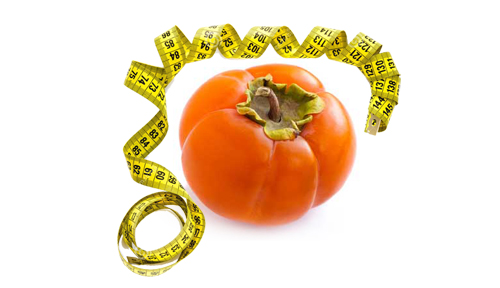
There are approximately 70 calories in one piece of persimmon. This is very little. With such a low calorie content, persimmon has a lot of fiber, which helps to improve digestion. Also, thanks to persimmons, they begin to be better absorbed nutrients from any food, even from the most monotonous and meager. That is, in the event that you are on a diet, persimmon must be included in your diet so that it helps to keep your body in order. The principle and diet of the persimmon diet.
natural antidepressant
Persimmon contains potassium and sugar. Thanks to these substances, persimmon is a natural antidepressant. To improve your emotional condition, relieve tension, relax after stressful situations, get rid of fatigue, you need to drink persimmon juice.
Energy source
Persimmon is rich in sugars, which the body absorbs very well. Once ingested, these sugars are converted into energy.
Therefore, this fruit is very well suited for children who are engaged in any sections or sports clubs, because in order to perform any physical exercise need a lot of energy.
To detoxify the body and cleanse the liver
Persimmon is rich in antioxidants. They do a lot in the human body useful features, including restore cells after damage by free radicals, neutralize the action of toxins.
Decreases blood pressure
People who suffer from hypertension are advised to include this product in their diet. Persimmon lowers blood pressure. Also, persimmon is the prevention of heart diseases that are associated with hypertension. There is a very good recipe that has proven its effectiveness.
You need to take a ripe fruit, remove the skin from it and knock down the pulp with a mixer. Mix the prepared liquid with a cup of fresh milk. You need to use such a cocktail three times a week three times a day.
Diuretic properties
Persimmon due to the content of calcium and potassium has diuretic properties. This fruit is much safer than any diuretic and also much more effective. After its use, potassium is not excreted from the body, and after taking any diuretics, such an effect can be very often found.
Persimmon during pregnancy
It is very useful for women who are expecting a baby to use this fruit. Persimmon contains a lot of trace elements, such as calcium, phosphorus, iron, potassium, magnesium, and vitamins. All these substances are necessary for the normal functioning of the body of a pregnant woman, as well as for her unborn child. Some minerals are found in persimmons in much greater quantities than in peaches, apples and pears.
Thanks to the use of persimmon, fever is reduced, cough is prevented, it can very well quench thirst. Persimmon is a good prevention of hypertension, which very often develops in pregnant women.
But do not overdo it, it will be enough to eat one fruit a day. If you eat persimmon in large quantities, then the digestive process may be disturbed, and stomach stones may also form. More information about the benefits and harms of persimmons during pregnancy.
No need to eat the skin
Among many people there is an opinion that persimmons, like pears, and should be eaten with the peel. But this opinion is wrong. Persimmon skin contains tannins, which contribute to the formation of stones in the stomach.
Fruit is contraindicated for diabetics
Persimmon contains approximately 11% sugar, as well as simple sugars such as glucose and sucrose. These sugars are very easily absorbed by the body, and this can cause hyperglycemia. This is very dangerous for those people who suffer from diabetes. What is dangerous diabetes.
Doesn't work well with protein-rich foods
Persimmon does not need to be eaten with crabs, shrimp and sea fish. There are tannic acids in persimmon, and under their influence, proteins begin to stick together. This prevents the food from being digested properly, resulting in the formation of bezoar stones.
Teeth are decaying
As strange as it may sound, but persimmon can cause tooth decay and tooth decay. This is due to the high concentration of pectin and sugar. The fibrous pulp, which is very easy to get stuck between the teeth, as well as tannic acids, lead to tooth decay and the development of caries. So after eating persimmon, you need to drink a glass of water, and even better rinse your mouth.
No need to eat persimmon on an empty stomach
Tannin and pectin, which are found in large quantities in persimmons, interfere with the normal digestive process after entering the stomach; under their influence, pieces of food stick together into dense lumps - bezoars (stomach stones). These stones after a while begin to become larger, painful sensations begin. A person may experience vomiting with blood, abdominal pain, and so on. Sometimes surgery is needed to get rid of these stones.
This fruit should not be taken by people in the postoperative period. Persimmon is also contraindicated if a person has intestinal adhesions. If the intestines are weakened, then a large amount of tannin found in persimmons can cause acute obstruction. After eating persimmons, the metabolism is disturbed (due to its astringents), so people who are obese need to exclude this product from their diet.
You do not need to give persimmons to children under three years of age. This is due to the fact that gastric juice reacts with tannins, resulting in a viscous sticky mass. It binds the pieces of the fetus in the child's stomach into one lump, and this can cause serious complications. It is best to offer persimmons to children when they are ten years old.
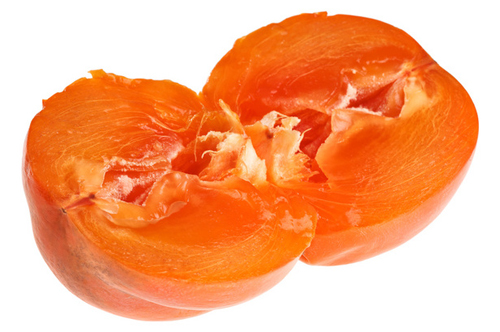
There are many varieties of this fruit. But conventionally they can be divided into two large groups- astringent varieties and non-astringent. Astringent fruits contain much more tannin, but they cannot be eaten when they are not fully ripe.
This useful fruit starts to appear on sale around the beginning of October. This product is very useful, but perishable, so you need to know how to properly store it. If you follow some simple rules storage of persimmons, then you can have a source of vitamins, magnesium, iron, iodine, calcium, fiber and other useful substances at hand all winter.
Persimmon can be frozen, dried, canned. Persimmon, which has just been purchased, can be stored very well with other products in the refrigerator, but you need to eat it for four days.
In order for persimmon to be stored for a longer time, it needs a temperature from about degrees to -1 degrees. At this temperature, persimmons can be stored for about three months. At the same time, the humidity of the air should be maintained within 80-90%, since at a humidity level below the fruit will begin to wrinkle. If the humidity is higher than indicated, then the fruits will become moldy.
Best of all, the fruits will be stored in the freezer. Thanks to quick freezing, all the beneficial properties of persimmons are preserved. If persimmons are stored in the freezer, then after defrosting, the fruits become not so tart and not so astringent, they are much tastier. Fruit should be thawed at room temperature. But when defrosted, the persimmon becomes very soft, so it can only be eaten with a spoon.
You can also dry the persimmon, after which it will become an oriental sweetness. For self-drying, you will need the hardest fruits that do not contain seeds. They need to be peeled, then cut into small pieces and put in the oven. It is necessary to dry persimmon at a temperature of 45-50 degrees. It is very important to periodically look at persimmons, as there is no specific cooking time. Readiness must be determined by eye. It is necessary to ensure that the fruits do not become dark. Dried persimmon comes out fragrant and very sweet. It's okay if the pieces are covered with a white coating - it's sugar.
Of course, everyone wants to choose a juicy, tasty and ripe persimmon. But how to do it? You need to follow these simple rules. Remember that a tasty persimmon should be round or rounded. If the persimmon is ripe, then its surface is shiny and very smooth. If there are damages, dark breaks or spots on the persimmon, then this means that the fruit has already begun to deteriorate. A good persimmon always has a rich and bright color.
You should also pay attention to the stem and leaves - they should be dark and dry. If you want the persimmon to lie with you for some time, then it is better to choose fruits that are stronger and harder. If you want to use persimmon almost immediately after purchase, then you need to choose a soft fruit.
In the event that you purchased a persimmon, and it turned out to be unripe, then you need to put it in the freezer. After thawing, it will become very soft and sweet. It is after freezing that harmful tannin and tannins disappear in persimmon, and it becomes not viscous. Also, to speed up the ripening process, you can put persimmon fruits in the same container with tomatoes, bananas, apples. These products release natural gas (ethylene), which contributes to the rapid ripening of persimmons. You can also put an unripe persimmon for 12 hours in warm water.